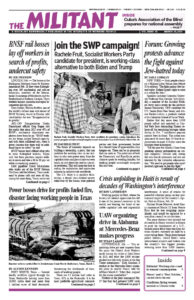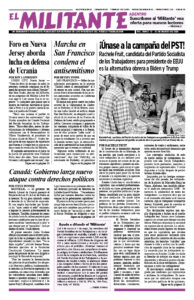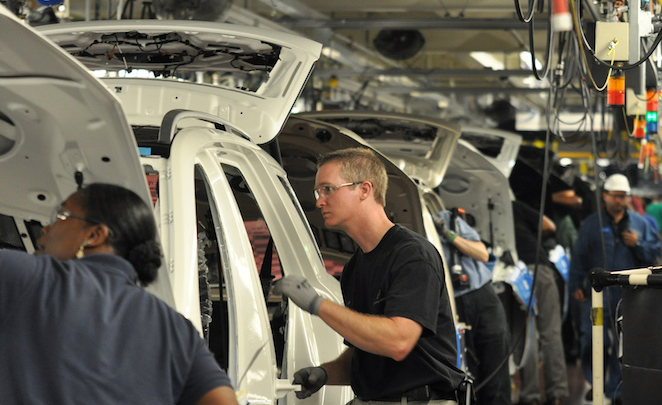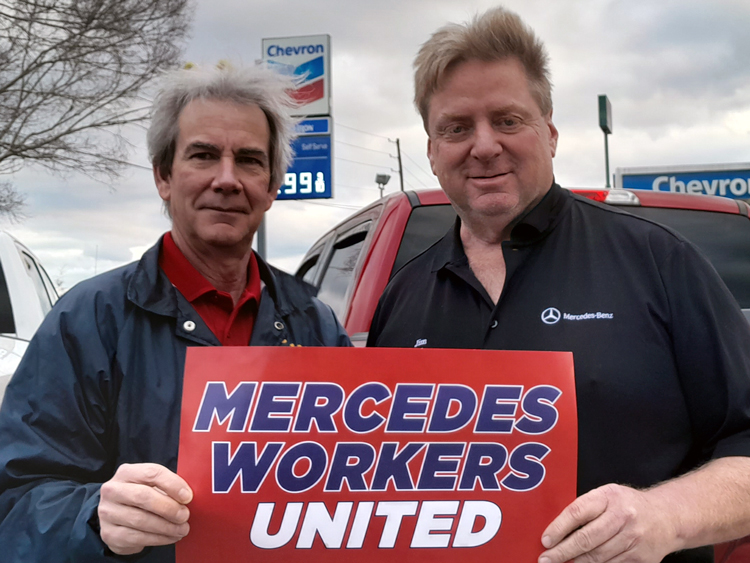COTTONDALE, Ala. — “Our organizing drive got new impetus from the gains the United Auto Workers made during the strike at John Deere in 2021 and what the UAW accomplished last fall with strikes at the Big Three automakers,” Kirk Gardner, a worker at the Mercedes-Benz assembly plant in nearby Vance, told the Militant March 9. “After that, support for the union snowballed.”
Workers at the plant announced Feb. 27 that they had gathered UAW cards from more than half the workers. There are 4,500 production workers.
Union supporters are organizing to win a yes vote to bring in the union. “We’re able to pass out leaflets as long as it’s not on company time,” said Jim Spitzley, who has worked at the plant for 27 years. “We have hats, stickers and buttons that we’re allowed to wear, but so far we can’t wear union T-shirts at work.” The company is holding mandatory meetings to try to convince workers to vote no.
Bosses impose ‘permatemps’
“When the 2008 recession hit,” Spitzley said, “they laid off 1,500 workers. Despite company promises, they never came back. Instead, more and more workers were hired as temps, and it took up to eight years for them to be hired as regular employees. We used to call them ‘permatemps.’ They’re 15% to 20% of the workforce now. The company also instituted a two-tier setup in 2010 where new hires got lower pay and fewer benefits.”
The company ended the two tiers, raised wages $2 an hour and increased bonuses after the UAW strikes last fall, hoping to undermine support for the union drive. Before that, workers had received only 42 cents in hourly raises over the previous six years.
One of the leaflets union members are using on the job contrasts the current and future wages at Mercedes to those of workers at the Big Three after last fall’s strikes. Over six weeks the UAW organized selective strikes of up to 50,000 workers to overcome deep concessions that the bosses and government had forced on the union in 2007.
Today new hires get $23.50 an hour at Mercedes compared to $25.53 at General Motors, Ford and Stellantis. By 2028 new hires at Mercedes will get only $27.50 an hour, compared to $42.94 at the Big Three.
“When we talked to our co-workers the biggest issues were higher pay, better benefits and fairness on the job,” Gardner said.
“Lots of workers get injured,” added Spitzley. “They’re often let go or else put right back on the job that injured them.” The company is always looking for ways to cut the time allowed for each operation and to add more jobs onto each worker, they said.
Almost all the union cards have been signed online, Gardner said. “But it’s still going to take union supporters talking to other workers, educating them about what the union is and answering their questions.”
The Vance plant was the first major Mercedes-Benz factory built outside of Germany. Since 1997 some 4 million vehicles have come off the line there, making the company billions of dollars in profits.
“We’ve learned that we can’t trust Mercedes with our best interests,” said Jeremy Kimbrell, in a YouTube video making public the support for the union at the plant. “There comes a time when enough is enough.”
Bosses say, “now is not the right time,” he added. “But here’s the thing. This is our decision. It’s our life. It’s our community. These are our families. It’s up to us.”
The announcement follows a similar effort at a Volkswagen plant in Chattanooga, Tennessee, where more than half the 4,000 workers have signed union cards.
According to the UAW, over 10,000 autoworkers at 14 nonunion auto companies, mainly in the Southeast, have recently signed union cards. Following last fall’s strikes, UAW President Shawn Fain announced a campaign to organize these plants.
Union supporters at Mercedes have built solidarity with labor struggles in Alabama in the last few years, including the hard-fought strike by the United Mine Workers of America at Warrior Met Coal in nearby Brookwood from April 2021 to February 2023.
They also backed a strike that won an end to wage tiers by 190 UAW members at ZF Chassis Systems in Tuscaloosa last fall. The company supplies axles for Mercedes and is the only one of many auto-parts suppliers in the state that is organized.
Union supporters at Mercedes are in touch with workers at some of the other plants where organizing drives are underway, including the Hyundai assembly plant in Montgomery.
Janice Lynn and John Benson contributed to this article.



